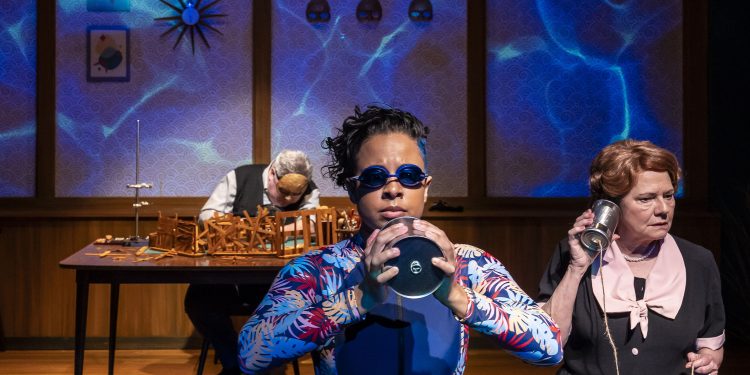By Rikki Lee Travolta
There is something very special about witnessing the early stages of a new work. You see what works, and you also get to see the potential for what could be further developed.
Shattered Glove Theatre is now presenting “Flood” – a new oddly comedic play about the end of the world. I say oddly comedic because the stage dynamic is theatre of the absurd, presenting dramatic issues under the guise of situations so absurd they toe the line of comedy.

The play focuses on Darren and Edith, a middle-aged married couple living on the 19th floor of a high-rise near the beach. From the outset of the play, Darren works diligently making something out of wooden sticks. His perch is up center stage, giving him command of the couple’s living room.
Darren has a whole routine for his building process. The table he sits at is covered with pieces of wood in random levels of assembly, obscuring the audience’s view enough that we don’t know just what it is that Darren is building. We know that it is small and that it is made of sticks and glue. Beyond that, we know little of his work. Only that he is consumed with it.
Darren wears a mask that covers all of his face except for his mouth. The mask appears to be made of wood and a host of identical masks are on display on the wall behind him.
Darren is not one who needs to hear himself talk. As the opening of the play demonstrates, he can sit silently absorbed in his work oblivious to the rest of the room. In fact, we discover he is rather oblivious to the rest of the world.
Darren is joined on stage by his wife Edith, who comes to share a pot of tea with her husband. Darren, however, fails to recognize Edith’s presence. She comes and goes several times, hoping to attract her husband’s attention. However, Darren’s entire focus is on his work with the sticks.
Complimented by a well-crafted set by Lauren Nichols, the action could well be from a 1950’s or 60’s family sitcom – the kind about married couples and their kids. It’s a set that could fit in a collection with the likes of “The Dick Van Dyke Show” or “I Love Lucy.”

Everything in the couple’s home is acceptably laid out. Nothing stands out. It is all cookie-cutter vanilla in tone. The only glaring swatch of color are some red bound books on the shelves and scattered around the room.
Eventually, Darren does take note of Edith, at which point he introduces the audience to the notion that he is in denial of reality. Darren argues that Edith has left him isolated and alone, refusing to acknowledge that she has been present. Not only present, she has been trying to get his attention to share a pot of tea.
Darren’s mask could well be a pair of horse blinders. It prevents him from seeing reality. Instead, he sees what he wants to see.
Edith talks to her husband about her concerns about the world, most notably the rain and rising waters. However, Darren is more comfortable living in his masked world of denials.
They have a system. Darren has the final say on all things. And so, if the conversation ever takes the couple to a place where a question is raised that Darren doesn’t have the answer to, it is up to Edith to record it in a book of things to be analyzed later. A red book.

It seems to be a quaint routine between a husband and wife. But we learn that there is not just one book of questions without answers. Rather, there are volumes and volumes of red-bound books containing all the things that Darren and Eddith hope to get around to talking about eventually. It’s as if because of these books, their whole lives are lived in denial.
Edith is not as oblivious as her husband. She is aware that waters are rising at a dangerous pace. The rising flood waters, it seems, are symbolic of the sense of fear and the unknown rising in the world. The world is becoming flooded with fear and uncertainty.
Darren and Edith have two grown children, who live apart from them. Darren Jr. and Edith Jr. are as different from their parents as humanly possible. They not only act nothing like their parents, they look nothing like their parents – despite their names being wholly unoriginal odes to their mother and father.
The children, adults themselves living on lower floors of the building, are aware of the flood. They are getting wet and their fear is escalating. But there is no way for Edith to help her children, as that they are connected to their parents only by tin cans and string – not even real phones.
The Shattered Globe Theatre production is only the second staging of “Flood.” It is a work in progress, and it is refreshing that playwright Mashuq Mushtaq Deen seems comfortable with this. This Chicago premiere serves to define what works in the script and what still needs amendments.
The production is directed by Kenneth Prestinizi, who also directed the first staging of the piece for Kansas City Repertory Theatre in 2022.

Linda Reiter plays Edith in an exceptional display of talent. We really see her inner struggle as she fights to rekindle the joys of the past with her husband, only for him to shut his eyes to anything that disrupts a notion of calm, quiet, and peace.
Her character is wrapped in the dressings of a 1950’s housewife, but more bubbles beneath the surface. Reiter’s characterization is on par with the work of great character actress Dianne Wiest. It is an outstanding performance.
H.B. Ward is very strong as Darren, ironically revealing how weak the character is behind his controlled front. You never catch Ward acting. He is always in character to just the right degree. The chemistry between Ward and Reiter is authentic and believable.
The roles of Darren Jr. and Edith Jr. are played by Carl Collins and Sarah Patin, respectively. They are far more real than their parents – displaying fear, confusion, and angst. The two actors do well within the limitations of the material, however for the play to really live up to its fullest potential, the characters need to be developed further.
Currently, the play runs 90 minutes without an intermission. However, there is room to grow. As the play moves into rewrites, the expansion of the offspring characters may extend the play into two acts. That would only serve to strengthen the play. The younger characters exist for a purpose, they just need to be defined better to properly fulfill that purpose.

Eventually, we do learn what Darren is building upstage at his desk throughout the play. It is an attempt at a remedy to the rising waters, but it only serves to demonstrate just how out of touch with the fears of the world Darren is. Good intentions don’t always provide a solid solution to a problem, and when you fail to focus on how big the problem is, your solution may be entirely disproportionate and ineffective.
I would love to see the characters of Darren Jr. and Edith Jr. expanded and developed to add more depth and definition to the story. I also wonder if Darren’s mask might be replaced with something akin to rose color glasses – as that he is not so much hiding from the world as failing to seeing it for the stark reality that it is. His character isn’t so much hiding, as failing to see.
The technical players bringing this new play to life for Chicago audiences include lighting designer Jared Gooding, sound designer Danny Rockett, costume designer Yvonne Miranda, props designer Jamie Auer, projection designer Smooch Medina. Also working behind the scenes are production manager Becca Smith, production stage manager Tina M. Jack, and assistant stage manager Erin Smith. Publicity is by Jay Kelly Public Relations. In particular, Rockett’s sound design is exceptional.
“Flood” is being presented through March 9, 2024 at Theatre Wit, 1229 W. Belmont in Chicago. There is paid street parking available and the theatre is easily accessible by public transportation.
It is an interesting play with many virtues. The playwright has a real gift for dialogue. There are some really good, observational insights in the dialogue, as well as some great humor. All in all it is a great foundation and a moving theatrical experience.
For tickets visit www.sgtheatre.org or call the box office at (773) 975-8150.
Photo credit: Liz Lauren
For more reviews visit: Theatre in Chicago – your source for What’s on Stage in the Chicago Area.





